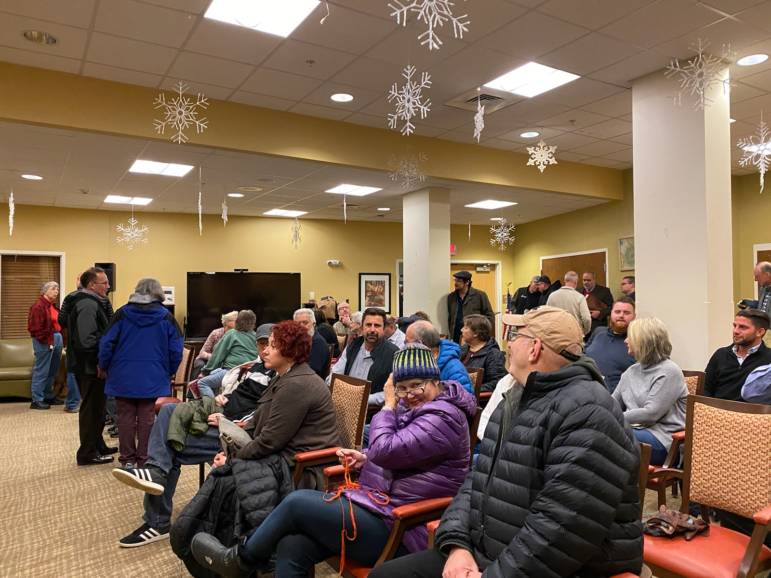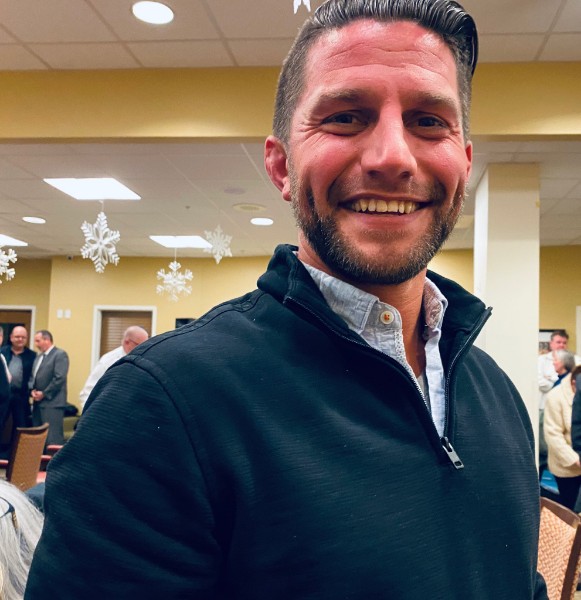
MANCHESTER, NH — The company operating a sober house at 70 Russell St. is running another one on Orange Street, again without a required variance.
Jonathan Gerson, executive director of Blueprint Recovery Center of Concord, admitted to operating the second sober house after residents, attending an informational meeting concerning the Russell Street sober house hosted by Ward 2 Alderman Will Stewart, called him out on it. One man said someone overdosed at the Orange Street house there last Nov. 28.
The revelation came during an informational meeting hosted by Ward 2 Alderman Will Stewart Monday night at Mt. Carmel Rehabilitation and Nursing Center.
Gerson said a “breakdown in communication” was the reason why no variance was obtained.
“You’re applying for variances because you got caught,” said neighborhood resident Wendy Antonelli.
Attorney Andrew A. Prolman, who represents Gerson and Blueprint Recovery, said they were seeking the city’s forgiveness for not getting the variance. He said his client believed because the building was being used for housing and it was located in a residential area that no variance was needed.
“We’re here asking for your forgiveness,” he said. “We’re going to help people. We’re not a fly-by-night operation.”
Neighbors, however, said Gerson knew a variance was needed when he opened the second sober house but didn’t seek one then.
Prolman told residents that the Russell Street sober house serves 16 men, 40 percent recovering from opiate addiction, another 40 percent recovering from alcoholism and 20 percent with miscellaneous addictions and sometimes a combination of opiates and alcohol.
He said the house is staffed 24/7, cameras are located throughout and are monitored. He said the facility just received its certification from the Commission on Accreditation of Rehabilitation Facilities.
The men living there are driven to the Blueprint Recovery Center in Concord each morning where they receive treatment. No treatment takes place on Russell Street, he said. While at Russell Street, the men sleep, eat and look for jobs, he said.
“We are a business,” Prolman said.

The Concord recovery center is one of 11 operated by Amatus Health Systems of Garrison, Md. According to its website, it has other centers in Maryland, the Washington, D.C., area, Georgia and Ohio. The company opened its Keep it Simple NH House at 70 Russell St. in October 2018.
Fire Chief Daniel Goonan estimates, based on emergency personnel responding to calls, that there may be up to 60 sober living homes in the city. He said Fire Prevention Bureau personnel follow up on those incidents but, he said, oftentimes the owner will say they are not running a sober living residence but are a family living in sobriety.
Goonan was pressed on why he hadn’t compiled a list of suspected sober houses and shared them with the other city officials. He said the list is “unofficial” but said the city officials, which included the City Solicitor’s Office, meet weekly to discuss issues affecting the city, including the sober houses.
As fire chief, he said his concern is for the safety of individuals. State Legislators, he said, passed an amended version of House Bill 311, which addresses the regulation of sober houses and was sponsored by Manchester Representatives Erika Connors, Jeffrey Goley and Patricia Cornell. It has been sent on to the New Hampshire Senate.
Connors explained that the spirit of the amended bill is aimed at those using the designation “sober living home” to get around life safety codes associated with hotels, apartments, and boarding/rooming houses for greater profits.
“Firefighters are responding to overdoses at high rates and upon entering are finding drugs and alcohol everywhere, four people to a basement room with no second point of egress, non-working smoke detectors, etcetera. These are major hazards for not only the residents, but also for our firefighters and first responders,” Connors said. “These operators are operating businesses with no goal of aiding in recovery, using a designation to circumvent life safety codes, and taking advantage of a population at risk. The goal of this legislation is to aid and protect those in recovery as well as protect our firefighters and first responders.”
Leon L. LaFreniere, the city’s director of Planning and Community Development, explained sober living is not defined under the city’s zoning regulations.

Residents could petition the Board of Mayor and Alderman to define it but LaFreniere said it must not conflict with federal laws including the Fair Housing Act, Americans with Disability Act, among others.
LaFreniere said the Russell Street sober house needed a variance because it was classified as congregate living because it offers support services.
Dan Cotter operates a sober living house on Dubuque Street. He said he is alive because of that sober house.
“I’ve been clean and sober for two years,” he’s aid. “I overdosed more at my parents’ house. They had to call emergency and the police department. Sober living saved me.”
Editor’s note: This story has been updated to include a link to the amended Bill 331 and edited to include comment from Rep. Erika Connors about the legislation.







